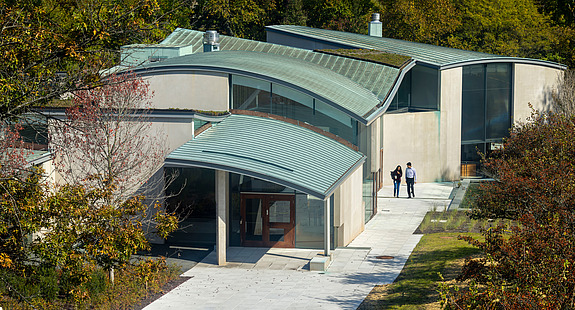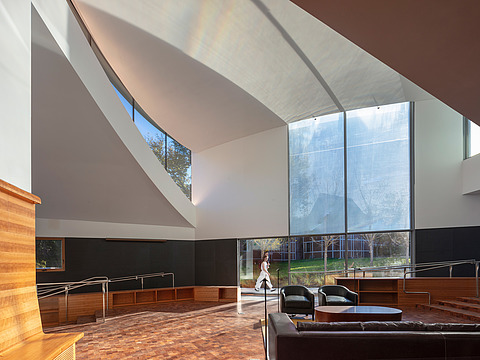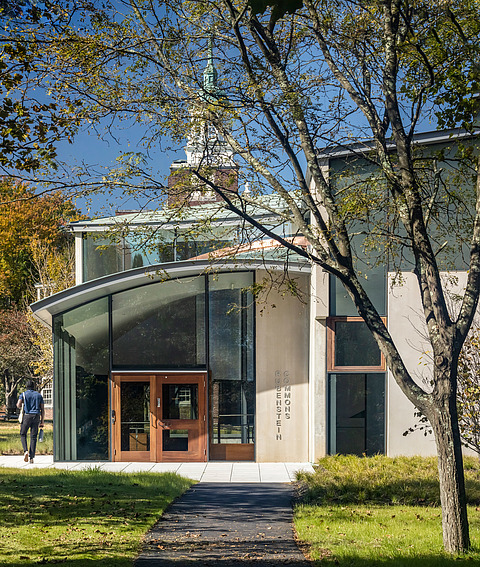Grand Opening of Rubenstein Commons at IAS

The Rubenstein Commons building at IAS has opened its doors, providing a nexus of flexible gathering spaces to support enhanced communication and collaboration among scholars, and forming an inviting social hub for the wider IAS community. Enabled through a visionary gift from businessman and philanthropist David M. Rubenstein, the Commons will have a transformative impact on intellectual and communal life at IAS, one of the world’s leading centers for curiosity-driven basic research.

“With the opening of this forum for curiosity, discovery, and critique, we celebrate the Institute’s enduring commitment to the nourishment of the global collective intellect,” stated David Nirenberg, IAS Director and Leon Levy Professor. “This is a place whose beauty will stimulate contemplation and whose space will invite the dialogue necessary for questioning at its most profound.”
Through its design, Rubenstein Commons will support community and academic life on the IAS campus by promoting communication and collaboration with a variety of social spaces and meeting rooms. Conceived as a “social condenser,” the building provides a communal and flexible gathering place for the Institute’s research community across all four Schools—Historical Studies, Mathematics, Natural Sciences, and Social Science. The Commons will also offer a space for the display of images and materials that tell the story of the Institute’s heritage and extraordinary scholarly community, from Einstein to today.
“By having the ability to come together, the great human brain can be improved because all brains, all humans benefit from talking to others,” remarked Rubenstein at the groundbreaking ceremony on March 14, 2018. “What the Commons is designed to do is to bring people together, who are the great brains of our society, and have them interact; and also, people who visit can meet with the scholars. So that’s really what it’s designed to do.”

Tasked with creating a new building with long-term architectural significance, the design by Steven Holl Architects—selected as the winner of an international competition in March 2016—integrates with the surrounding landscape and campus, including the Institute’s flagship building, Fuld Hall, designed by Jens Fredrick Larson in his characteristic Colonial Revival style.
“It has been an honor and a joy to work on such an extraordinarily important project for the Institute for Advanced Study,” said Steven Holl. “We only hope that the inspired feelings we had in creating and making these spaces can contribute to the future social life of the Institute.”
The building will be dedicated with a ribbon-cutting ceremony bringing together scholars, IAS Trustees, chief architectural and building partners, local officials, business leaders, foreign dignitaries, and dozens of members of the campus and local community. Details of the rescheduled ceremony will be forthcoming.
A downloadable press kit is available here.
About Steven Holl Architects
Steven Holl Architects is a 35-person architecture and urban design office founded in 1977, and working globally as one office from three locations, New York City, the Hudson Valley, and Beijing. Steven Holl leads the office with partners Noah Yaffe, Chris McVoy, Roberto Bannura, and Dimitra Tsachrelia. The firm has realized architectural works nationally and overseas, with extensive experience in the arts, and campus and educational facilities. Recent notable projects include the Nancy and Rich Kinder Building at the Museum of Fine Arts, Houston (2020); the Winter Visual Arts Building on the historic Franklin & Marshall College campus (2020); the REACH Expansion at the John F. Kennedy Center for the Performing Arts in Washington, D.C. (2019); and the Lewis Arts Complex at Princeton University (2017).
About the Institute
The Institute for Advanced Study has served the world as one of the leading independent centers for theoretical research and intellectual inquiry since its establishment in 1930, advancing the frontiers of knowledge across the sciences and humanities. From the work of founding IAS faculty such as Albert Einstein and John von Neumann to that of the foremost thinkers of the present, the IAS is dedicated to enabling curiosity-driven exploration and fundamental discovery.
Each year, the Institute welcomes more than 200 of the world’s most promising post-doctoral researchers and scholars who are selected and mentored by a permanent Faculty, each of whom are preeminent leaders in their fields. Among present and past Faculty and Members there have been 35 Nobel Laureates, 44 of the 62 Fields Medalists, and 22 of the 25 Abel Prize Laureates, as well as many MacArthur Fellows and Wolf Prize winners.
Contact:
Lee Sandberg
Institute for Advanced Study
lsandberg@ias.edu
(609) 455-4398
Julia van den Hout
Original Copy (on behalf of SHA)
julia@originalcopy-nyc.com
(773) 203 2295


